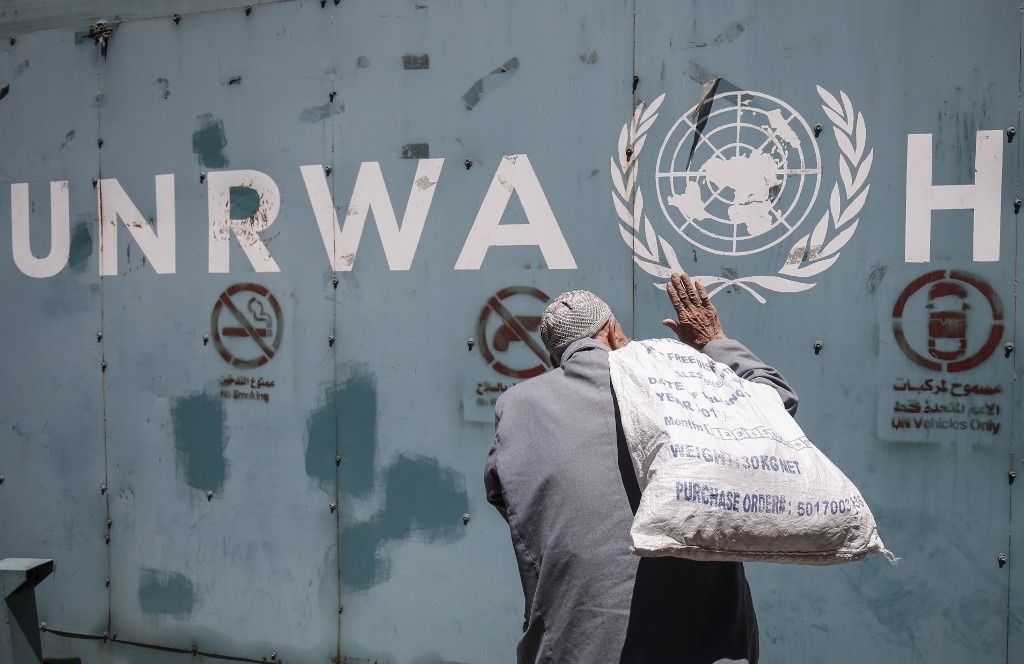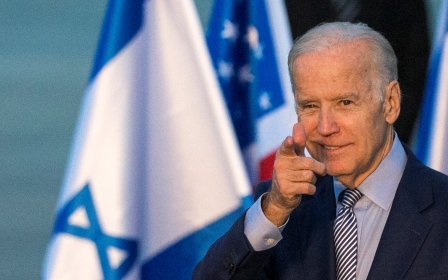US's plans to restore aid to Palestinians 'fully comply with law,' Biden team says

Resuming US aid to Palestine will not violate legislation against US funds being allocated to the Palestinian Authority (PA) over its welfare payments to the families of those imprisoned by Israel, a State Department spokesperson said.
The official provided the clarification to media following allegations by Republican lawmakers that the administration's plans to resume US aid to Palestine would violate the 2018 Taylor Force Act.
"In administering aid, the Biden-Harris administration will fully comply with US law, including the Taylor Force Act," a State Department spokesperson said in a media statement.
Earlier this week, Richard Mills, acting US ambassador to the UN, announced that the Biden administration plans to restore US aid to Palestine and re-open Palestinian diplomatic missions in Washington that were shuttered under former president Donald Trump.
Following Mills's announcement, Republican Senator Tom Cotton told the Washington Free Beacon that any resumption of aid to the PA would inadvertently provide the government with funds that would be used to continue its prisoner welfare programme.
"The resumption of any US foreign assistance that indirectly funds the Palestinian Authority's pay-for-slay terrorist program would violate US law, betray our Israeli partners, and put Americans living in or visiting Israel in harm's way," Cotton said.
Palestinians view suspects jailed in Israel as prisoners of war held by an illegal occupation force. The funds, the PA says, are welfare payments made to support political prisoners and their families.
More than 4,400 Palestinians, including 160 children and 440 held without charge or trial, are currently imprisoned by Israel.
Palestinians have long challenged the validity of Israel's military court system, which solely tries Palestinians. In 2010, the court self-reported a 99.74 percent conviction rate.
The PA has also pointed to the high rates of unemployment, stagnant at almost 30 percent in the occupied West Bank and 50 percent in Gaza, as reasons the payments are necessary for society to function.
Meanwhile, in addition to questions over aid, David Friedman, the Trump administration's ambassador to Israel, has challenged the legality of allowing the Palestinians to reopen a diplomatic mission in Washington.
Trump's gifts to Israel
+ Show - HideThe Trump administration's bombshell announcement that it no longer considers Israeli settlements in the occupied West Bank illegal under international law has sent shockwaves through the region.
But it's only the latest in a long line of unilateral gifts offered by Donald Trump to Israel since the president took up residence in the White House in January 2017.
Middle East Eye takes a look at how Trump has promoted Israeli interests at the expense of the Palestinians:
Pro-Israel aides: Friedman, Kushner and Greenblatt
From the first moment Trump stepped in the Oval Office he appointed a raft of aides with close ties to Israel and the settlement movement.
Two of the first, and most prominent, tasked with dealing with the Israel-Palestine conflict were Jared Kushner, his son-in-law, and Jason Greenblatt, his personal lawyer.
Kushner and Greenblatt have been heavily involved in the so-called "deal of the century" peace plan, however their loyalties are heavily weighed in Israel's favour.
Kushner's family are close friends of Israeli Prime Minister Benjamin Netanyahu, and donated money to settlement organisations.
As Middle East envoy, Greenblatt, meanwhile, has consistently defended Israeli actions against Palestinians.
David Friedman, US ambassador to Israel, has been the Israelis' chief cheerleader since taking office in May 2017, telling the New York Times that “under certain circumstances, I think Israel has the right to retain some, but unlikely all, of the West Bank".
In July, Friedman and Greenblatt opened a highly controversial tunnel under the Palestinian neighbourhood of Silwan in occupied East Jerusalem.
The US ambassador was seen taking a hammer to a wall in the ancient archaeological site with particular zeal, in an event organised by settler group ELAD.
Recognising Jerusalem as Israel's capital
In a clear sign that Washington was prepared to upend years of convention and consensus in Israel's favour, Trump announced in December 2018 that the United States recognised Jerusalem as the Israeli capital.
East Jerusalem has been occupied since the 1967 Middle East war, and the Palestinians seek it as their capital of any future state.
The international community has maintained that Jerusalem's status must be agreed upon in a settlement between the Israelis and Palestinians, and in response to Trump's move 128 states condemned the decision in a UN General Assembly vote.
On 14 May 2018 - the 70th anniversary of Israel's founding - the US officially moved its embassy from Tel Aviv to Jerusalem.
Demonstrations erupted in the Gaza Strip and the West Bank, with Israeli forces killing at least 57 Palestinians as Kushner and his wife Ivanka Trump grinned at the embassy's opening.
Cutting funds for UNRWA
In early 2019, the US cut all funding to the UN agency that supports Palestinian refugees, UNRWA, saying its business model and fiscal practices were of an "irredeemably flawed operation".
UNRWA provides services to about five million Palestinian refugees, with the US a significant donor since the agency's founding following the 1948 creation of Israel.
In 2018, Washington gave UNRWA $125m in aid, and the agency has scrambled to make up for the sudden shortage.
The Golan Heights
In another unilateral decision, Trump in March announced that the US recognised Israeli sovereignty over the occupied Golan Heights.
The Golan was captured from Syria in 1967 and is both highly strategic and resource-rich. The majority of its inhabitants are Syrian Druze, who largely refuse to engage with Israeli rule.
Some 20,000 illegal Israeli settlers also live on the plateau.
Trump's decree was a gift to Israeli Prime Minister Benjamin Netanyahu ahead of the April elections, and was signed in his presence alongside Friedman, Greenblatt and Kushner.
In a post to Twitter, Friedman asserted that the reopening of diplomatic offices "is against federal law" based on the same PA prisoner welfare programme.
The Biden administration has yet to release a timeline as to when its moves to normalise relations with Palestine will take place, but insists on the legality of such policies.
Still, the legal challenges brought up by both Cotton and Friedman underscore a range of obstacles Biden faces in restoring ties with the Palestinians and reversing actions taken by Trump, who overturned decades of US Middle East policy, particularly regarding Israel.
Middle East Eye delivers independent and unrivalled coverage and analysis of the Middle East, North Africa and beyond. To learn more about republishing this content and the associated fees, please fill out this form. More about MEE can be found here.





